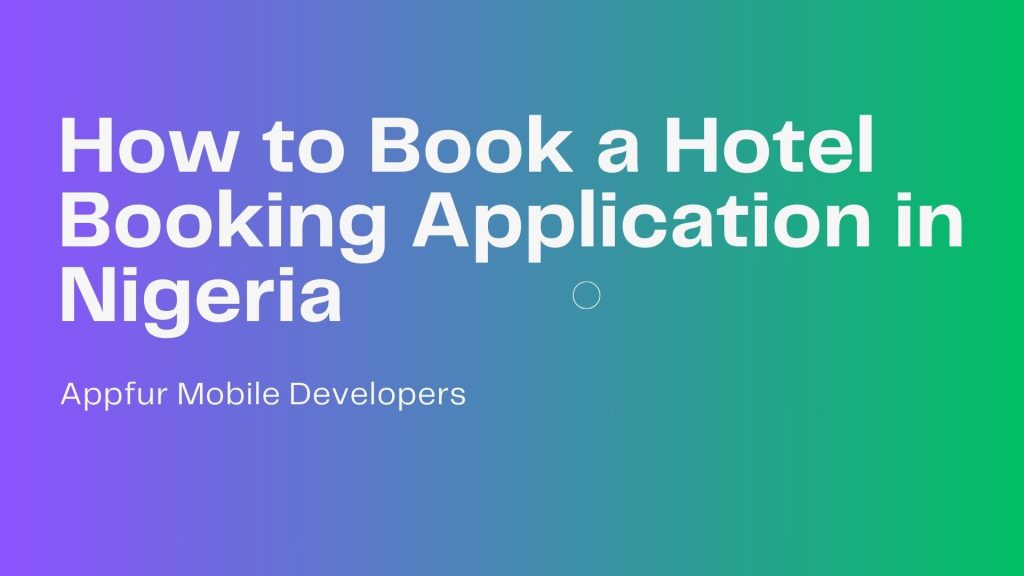Did you know that The mobile travel booking market is worth $228 billion in 2024 and is projected to grow to over $526 billion by 2032. and that 39% of users prefer an app over a mobile website because of speed, and 30% prefer it for its increased functionality

Creating a hotel booking application tailored for the Nigerian market is an excellent way to tap into the growing travel and tourism industry. With increasing internet penetration and smartphone usage in Nigeria, such an app can help travelers find and book accommodations conveniently while providing a lucrative business opportunity for developers and entrepreneurs. Here’s a step-by-step guide to building a hotel booking app for Nigeria:
Step 1: Research and Planning
Understand the Market
- Identify user needs: Conduct surveys to understand what potential users value most in a hotel booking app (e.g., affordability, proximity, user reviews, payment options).
- Competitor analysis: Analyze existing platforms like Jumia Travel or Hotels.ng to identify gaps you can fill.
Define Key Features
Your app should include:
- Search and Filters: Allow users to search by location, price, amenities, and ratings.
- User Profiles: Enable account creation and management.
- Hotel Listings: Include descriptions, images, amenities, and room availability.
- Booking System: Allow users to book and confirm hotel reservations.
- Payment Integration: Integrate Nigerian payment gateways like Paystack, Flutterwave, or bank transfer options.
- Customer Support: Provide in-app chat or support options.
Step 2: Design the App
Wireframing and Prototyping
Use tools like Figma or Adobe XD to create a visual blueprint of your app. Focus on:
- User-friendly navigation.
- Intuitive design for both desktop and mobile users.
Branding
Develop a memorable logo, color scheme, and branding elements that resonate with the Nigerian audience.
Step 3: Choose the Technology Stack
Frontend Development
- Use React Native or Flutter for cross-platform app development.
- For a web interface, consider React.js or Vue.js.
Backend Development
- Use frameworks like Node.js, Django, or Laravel.
- Opt for a reliable database such as MySQL, PostgreSQL, or MongoDB.
APIs and Integrations
- Payment APIs: Paystack, Flutterwave.
- Google Maps API for location-based searches.
- SMS and Email APIs for notifications (e.g., Twilio, Nexmo).
Step 4: Develop the App
Frontend Implementation
- Build screens for login, hotel search, booking, and user profiles.
- Ensure responsiveness for various devices.
Backend Development
- Develop APIs to handle user authentication, booking management, and payment processing.
- Ensure secure handling of user data with encryption.
Testing
- Test the app on multiple devices for bugs and usability issues.
- Conduct beta testing with a small group of Nigerian users to gather feedback.
Step 5: Deployment and Maintenance
Launch the App
- Publish your app on Google Play Store and Apple App Store.
- Create a marketing campaign to announce your app’s launch. Use social media platforms like Instagram, Twitter, and Facebook.
Ongoing Maintenance
- Regularly update the app to fix bugs and add new features.
- Monitor user reviews and feedback to improve the app experience.
Step 6: Marketing and Monetization
Marketing Strategies
- Partner with hotels in Nigeria for exclusive deals.
- Offer referral bonuses to users who invite others.
- Run targeted ads focusing on travelers and tourists.
Monetization Options
- Commission-based model: Charge hotels a percentage for each booking.
- Featured listings: Allow hotels to pay for better visibility.
- Subscription plans for frequent users.
Challenges and Tips
Common Challenges
- Payment reliability: Ensure seamless and secure payment processing.
- Connectivity issues: Optimize the app for users with limited internet access.
Pro Tips
- Localize the app: Offer language options and integrate features like local currency display.
- Build trust: Implement user reviews and ratings to guide decision-making.
- Support offline booking options for areas with low internet connectivity.
Creating a hotel booking app in Nigeria requires thorough research, careful planning, and consistent user engagement. With the right features and strategies, your app can become a go-to solution for travelers across the country.
We design and build high-quality, scalable mobile apps tailored to your needs.
Let’s talk! Message us on WhatsApp now: Click Here
Your next big app starts here!
